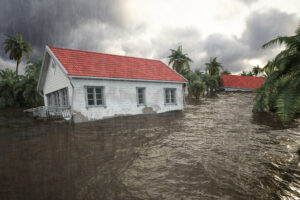5 Things You Should Do In the Event of a Flood
-

The Atlantic hurricane season runs from June 11 to November 30 each year, with the peak occurring in September. Throughout this active period, hurricanes and tropical storms often result in floods on Caribbean islands, including Jamaica.
A flood is defined as an overflow of a large amount of water beyond its normal limits, onto what is normally dry land. As the 2022 hurricane season winds down, we should remain vigilant, as often late season storms can bring heavy rain. Here are five things you can do when a flood threatens.
Evacuate As Required
If there is an evacuation order in effect for your area, you need to leave right away. Pack vital documents such as passports and property titles, medication, cell phone chargers and a change of clothes. If you have young children, take along a few games for them. Evacuation orders protect your safety as well as the safety of first responders, who may be called out in unsafe conditions to carry out rescues for those who do not evacuate.
Stock Supplies
If an evacuation is not required, get enough supplies to keep you safe for at least a week, including non-perishable food and drinking water. Remember, you may lose power for an unknown period of time. Store medication, batteries, dry clothing and blankets in high places, so that flood waters will not destroy them.
Put Important Documents Away Safely
Place important documents such as birth certificates, insurance documentation, identification cards and passports in waterproof containers to prevent water damage and store them off the ground.
Move Valuables to Higher Floors
If possible, move valuable items such as TVs, electronics, and anything else of value to your home’s highest available area.
Don’t Walk or Drive Through Floodwaters
Driving or walking through floodwaters is particularly risky because the water could rise suddenly and sweep you or your car away. Floodwaters often contain hazardous debris conductive due to downed power lines. When a flood threatens, only go outside your home in emergencies.
Look For An Exit
When flood waters rise quickly, it is important to note and plan for potential escape routes around your home. Can you get out onto the roof? Relocate to a safe elevated area of your home if flood waters threaten to inundate your home.

